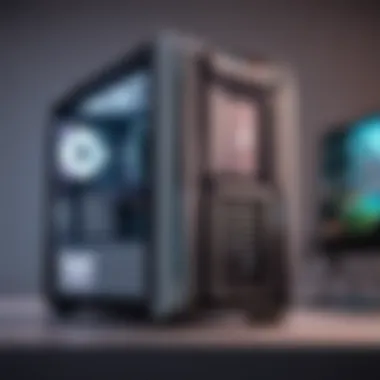Unveiling the Intricacies of Average Gaming PC Specs: An In-Depth Analysis for Gamers


Game Overview
When delving into the realm of average gaming PC specifications, it is crucial to comprehend the nuanced details that shape the gaming experience. From the central processing units (CPUs) to the graphical processing units (GPUs) and random access memory (RAM) capacities, each component's significance warrants meticulous analysis. Marking the foundation for an optimal gaming setup, these components play a pivotal role in maximizing gaming performance and visual fidelity.
Strategy Guides
Upon embarking on the journey of optimizing gaming PC specs, beginners often seek fundamental tips to enhance their gameplay, while seasoned players navigate towards advanced tactics for honing their competitive edge. An exploration into map-specific strategies unveils the strategic intricacies that differentiate players' approaches across diverse gaming environments. Additionally, agent-specific tactics and playstyles highlight the unique attributes of in-game characters and their tactical nuances.
Patch Updates
The landscape of gaming is ever-evolving, marked by the constant influx of patch updates that introduce transformative changes to gameplay mechanics and in-game assets. A summary of recent game patches sheds light on the adjustments made to agents, weapons, and maps, shaping the gaming experience for players. Examining the community feedback on patch notes offers valuable insights into player sentiments and preferences, while predictions for upcoming updates serve as a compass for anticipating the future direction of the gaming ecosystem.
Esports Coverage
In the realm of gaming, esports stands as a pillar of competitive engagement, showcasing the pinnacle of skill and strategy in virtual battles. A comprehensive overview of recent Valorant esports events provides a window into the electrifying tournaments that captivate audiences worldwide. Through tournament predictions and analysis, enthusiasts gain a deeper understanding of the competitive landscape, while insights on the current professional meta unravel the strategies and trends shaping the competitive arena.
Player Community
Beyond the confines of virtual battles, the player community manifests as a vibrant tapestry of diversity, creativity, and camaraderie. By featuring player highlights, the spotlight shines on exceptional individuals whose skills and contributions enrich the gaming landscape. Furthermore, the community-created content showcase celebrates the artistic endeavors and innovative creations crafted by players, fostering a culture of creativity and collaboration. Within the forum spotlight, trending topics illuminate the pulse of the player community, sparking discussions and insights that reverberate throughout the gaming stratosphere.
Introduction to Gaming PC Specs
In the realm of gaming, the demand for optimal PC specs is a critical consideration that can significantly influence the overall gaming experience. Players are constantly seeking higher performance, smoother gameplay, and enhanced graphics, driving the need for a deep understanding of gaming PC specifications. From the processing power of the CPU to the rendering capabilities of the GPU, each component plays a vital role in shaping the quality of gaming sessions. As such, exploring and comprehending the intricacies of these specs is paramount for any avid gamer looking to elevate their setup.
Importance of Optimal PC Specs for Gaming
Delving into the importance of optimal PC specs for gaming unveils a world where speed, efficiency, and reliability reign supreme. The heart of any gaming rig is its ability to handle the latest titles without lag or performance issues, making the choice of components a critical endeavor. Optimal PC specs ensure that games run smoothly, graphics are displayed at their best, and overall immersion is heightened. By investing in high-quality components tailored to gaming needs, players can unlock the full potential of their favorite titles, all while ensuring a seamless gaming experience.
Factors Influencing Gaming Performance
Central Processing Unit (CPU)
The Central Processing Unit (CPU) serves as the brain of a gaming PC, dictating the speed and efficiency of data processing during gameplay. With a focus on clock speed and the number of cores, CPUs can significantly impact gaming performance. Processors with high clock speeds and multiple cores excel in handling intensive gaming tasks, ensuring swift calculations and seamless operation. When selecting a CPU, considerations such as architecture, cache size, and power efficiency play crucial roles in determining the overall performance of a gaming setup.
Graphics Processing Unit (GPU)


The Graphics Processing Unit (GPU) is responsible for rendering the visuals in games, translating data into vibrant images on the screen. GPU performance is influenced by factors like VRAM capacity and architecture, determining how well a graphics card can handle complex visual effects. Players often navigate the choice between NVIDIA and AMD GPUs, weighing factors like benchmarking data and driver support to optimize performance in their gaming rigs.
Random Access Memory (RAM)
Random Access Memory (RAM) acts as a temporary storage space that holds data for quick access by the CPU, directly impacting multitasking efficiency and overall system responsiveness. The capacity of RAM, along with its speed and latency, plays a crucial role in gaming performance. Finding the optimal balance of RAM capacity and speed ensures smooth gameplay and swift multitasking abilities.
Storage Options
The selection of storage options, whether solid-state drives (SSD) or hard disk drives (HDD), significantly impacts gaming performance. SSDs offer faster boot times and loading speeds compared to HDDs, enhancing overall system responsiveness. NVMe SSDs, in particular, provide improved performance and future-proofing benefits, ensuring gamers can harness the latest advancements in storage technology for an optimized gaming experience.
Overview of Average Gaming PC Specs
Summarizing the wide array of components that make up average gaming PC specs paints a holistic picture of the intricate requirements for an optimized gaming setup. From the seamless coordination of CPU and GPU to the swift access provided by RAM and storage options, each component contributes uniquely to the gaming experience. Understanding and selecting the ideal components tailored to specific gaming needs is crucial for players looking to build or upgrade their gaming rigs with an eye towards optimal performance and immersive gameplay.
CPU Specifications for Gaming
In exploring the realm of average gaming PC specs, delving into the nuances of CPU specifications holds a paramount significance. The CPU, or Central Processing Unit, acts as the brain of the computer, dictating its processing power and efficiency in handling various gaming tasks. When it comes to gaming, factors such as clock speed and core count become pivotal in determining the overall performance of the system. Understanding the role of CPUs in gaming setups is crucial for gamers aiming to optimize their gaming experience to its fullest potential.
Clock Speed and Cores
Importance of Clock Speed
The clock speed of a CPU refers to the rate at which it can execute instructions per second, typically measured in gigahertz (GHz). This vital parameter directly influences how quickly the processor can perform tasks, making it a key element in determining gaming performance. A higher clock speed results in faster computations, enabling smoother gameplay, quicker loading times, and overall improved system responsiveness. Gamers opting for higher clock speeds can expect enhanced frame rates and reduced latency, contributing to a more immersive gaming experience overall.
Benefits of Multiple Cores
In the realm of CPU specifications for gaming, the number of cores plays a crucial role alongside clock speed. Multiple cores allow the CPU to handle multiple tasks concurrently, leading to improved multitasking capabilities and better efficiency in processing data. Games that can leverage multi-core CPUs often benefit from enhanced performance, especially in scenarios demanding heavy computational loads such as high-resolution gaming and complex simulations. By distributing tasks across multiple cores, gamers can experience smoother gameplay, reduced stuttering, and increased overall productivity in gaming setups.
GPU Requirements for Gaming
In the realm of gaming PC specifications, the GPU (Graphics Processing Unit) stands out as a pivotal component that directly influences gaming performance. A GPU's importance lies in its ability to render complex graphics, handle intricate visual effects, and provide smooth gameplay experiences. Gamers looking to optimize their setups must carefully consider specific elements of GPU requirements to ensure seamless gaming sessions.
Graphics Card Performance
VRAM Capacity:
When delving into Graphics Card Performance, the VRAM (Video Random Access Memory) capacity emerges as a critical aspect that significantly impacts gaming. VRAM serves as dedicated memory for the GPU, storing textures, frame buffers, and other essential data for rendering visuals efficiently. The VRAM capacity determines how much graphical information the GPU can handle at once, directly affecting performance and visual quality. Opting for a higher VRAM capacity ensures smoother gameplay, especially in graphically demanding titles, as it allows for quicker access to stored data.


GPU Architecture:
Another pivotal aspect of Graphics Card Performance is GPU architecture, defining how the GPU processes tasks and executes calculations. The architecture determines the efficiency, power consumption, and overall performance of the graphics card. Different architectures offer unique features such as parallel processing capabilities, specialized cores for specific tasks, and optimized workflows. Choosing the right GPU architecture aligns with the desired gaming experience, whether prioritizing raw performance, energy efficiency, or specialized rendering capabilities.
NVIDIA vs. AMD GPUs
Benchmarking Data:
Comparing NVIDIA and AMD GPUs involves analyzing benchmarking data, which provides crucial insights into real-world performance metrics across various gaming scenarios. Benchmarking assesses factors like frame rates, visuals, and overall gaming experience, aiding gamers in selecting the most suitable GPU for their needs. NVIDIA GPUs often excel in specific scenarios, showcasing superior performance in ray tracing, while AMD GPUs may offer better value propositions or efficiency in certain applications.
Driver Support:
A vital consideration when choosing between NVIDIA and AMD GPUs is the level of driver support offered by each manufacturer. Driver support influences the GPU's compatibility with new games, optimization for performance improvements, and overall stability during gaming sessions. NVIDIA and AMD regularly release driver updates to enhance user experiences, address issues, and introduce new features. Evaluating the quality and frequency of driver support can help gamers make informed decisions when selecting between NVIDIA and AMD GPUs for their gaming rigs.
RAM Considerations for Gaming
In the realm of gaming PC specs, the significance of Random Access Memory (RAM) cannot be overstated. RAM plays a pivotal role in ensuring smooth and efficient performance during gaming sessions, as it directly impacts the system's ability to handle multiple tasks simultaneously. This section sheds light on the crucial aspects of RAM considerations for gamers, emphasizing its critical role in optimizing the gaming experience.
Impact of RAM Capacity
When delving into the impact of RAM capacity on gaming performance, one key aspect that emerges is the concept of the 'Sweet Spot for Gaming.' This term refers to the ideal amount of RAM required to achieve optimal performance without overspending on excessive memory capacity. The Sweet Spot for Gaming is a delicate balance between having enough RAM to support resource-intensive games and avoiding unnecessary costs associated with high-capacity modules. Gamers often strive to pinpoint this sweetspot to strike a balance between performance and cost-efficiency, making it a prevalent consideration in the gaming community. Understanding and implementing the Sweet Spot for Gaming can significantly enhance gameplay experiences by ensuring smooth and lag-free performance.
Another essential facet of RAM considerations for gaming is the concept of Multitasking Efficiency. In today's gaming landscape, multitasking has become increasingly common, with players running multiple applications and processes simultaneously. The RAM's ability to handle concurrent tasks efficiently directly impacts the overall gaming experience. By prioritizing Multitasking Efficiency in RAM selection, gamers can seamlessly switch between tasks, run background applications, and maintain optimal performance levels during gameplay. The efficiency of RAM in multitasking scenarios influences load times, responsiveness, and overall system stability, making it a crucial factor for gamers seeking a seamless gaming experience.
RAM Speed and Latency
The speed and latency of RAM modules play a vital role in determining the overall performance of a gaming PC. When discussing the influence of RAM speed on performance, it is essential to consider the rate at which data can be read from and written to the memory modules. Higher RAM speeds result in faster data transfer rates, leading to reduced load times, smoother gameplay, and improved system responsiveness. Gamers looking to squeeze out every bit of performance from their systems often opt for high-speed RAM modules to gain a competitive edge in demanding gaming environments.
On the flip side, Compatibility Issues can arise when dealing with RAM speed and latency considerations. Not all RAM modules are compatible with every motherboard, and selecting incompatible components can lead to system instability and performance issues. Understanding the compatibility requirements of RAM modules with your existing hardware is crucial to avoid potential conflicts and ensure seamless integration. By addressing Compatibility Issues proactively, gamers can optimize their gaming rigs for peak performance and avoid potential pitfalls that may hinder their gaming experience.
Storage Options for Gaming PCs
In the realm of optimal gaming PC performance, the choice of storage options holds a pivotal role. Selecting the right storage solution can significantly impact gaming experience. When considering Storage Options for Gaming PCs, factors such as speed, capacity, and reliability come into play. Solid State Drives (SSDs) and Hard Disk Drives (HDDs) are the primary options available to gamers.
SSD vs. HDD


Boot Time and Loading Speed
Boot Time and Loading Speed are crucial aspects of gaming performance. SSDs, known for their lightning-fast speed, excel in reducing boot times and loading games swiftly. The inherent lack of moving parts in SSD technology contributes to its rapid data retrieval, making it an ideal choice for gamers seeking quick access to games and applications. The swift response of SSDs enhances gaming fluidity and reduces waiting times, elevating the overall gaming experience.
Cost-Effectiveness
Cost-effectiveness plays a significant role in the storage options for gaming PCs. HDDs, although slower compared to SSDs, offer a more budget-friendly storage solution with higher capacities at lower costs per gigabyte. For gamers looking to store a large library of games without exceeding their budget, HDDs present a viable option. While HDDs may sacrifice speed for storage capacity, they remain a practical choice for gamers prioritizing cost-efficiency without compromising on storage space.
NVMe SSDs and Their Benefits
Performance Comparison
Comparing NVMe SSDs with traditional SATA SSDs reveals a marked difference in performance. NVMe SSDs leverage PCIe lanes, facilitating faster data transfer rates than SATA interfaces. The improved read and write speeds of NVMe SSDs enhance game loading times and software responsiveness, ultimately boosting gaming performance. For gamers seeking exceptional speed and efficiency, NVMe SSDs prove to be a worthy investment.
Future-Proofing
Future-proofing is a key consideration for gamers looking to enhance their gaming setups for long-term performance. NVMe SSDs, with their advanced technology and rapid data processing capabilities, offer a future-proof storage solution. The compatibility of NVMe SSDs with upcoming technologies ensures that gamers can stay abreast of evolving gaming requirements without needing frequent storage upgrades. Investing in NVMe SSDs not only enhances current gaming experiences but also prepares gamers for future developments in the gaming industry.
Wrapping Up: Building Your Ideal Gaming Rig
In the realm of gaming PCs, the process of wrapping up and building your ideal gaming rig is a pivotal stage that demands careful consideration and strategic planning. This section serves as the culmination of our journey through average gaming PC specs, emphasizing the critical significance of assembling a system tailored to your gaming preferences and requirements. By delving into the nuances of selecting the right components and optimizing performance, you pave the way for a seamless and immersive gaming experience.
Budget-Friendly vs. High-End Builds
Key Components to Prioritize
When embarking on the endeavor of crafting your ideal gaming rig, the selection of key components holds paramount importance in determining the overall performance and capabilities of your system. One crucial aspect to prioritize is the quality of the CPU, as it serves as the brain of your setup, influencing tasks ranging from gaming to multitasking efficiency. Opting for a high-performance CPU ensures smooth gameplay and swift execution of commands, making it a vital investment for avid gamers seeking optimal results. The versatility and reliability of a top-tier CPU make it a popular choice among enthusiasts, significantly enhancing the gaming experience by providing seamless operation and enhanced processing power. The innate capabilities and cutting-edge features of a premium CPU elevate the gaming rig to new heights, amplifying its capabilities and ensuring a competitive edge in the gaming landscape.
Upgrade Path Considerations
In the context of building your ideal gaming rig, contemplating the upgrade path is essential to future-proof your system and adapt to evolving gaming demands. Considering components that allow for scalability and easy upgradability is crucial to extending the lifespan and relevance of your gaming setup. Embracing technologies that support modular upgrades and advancements in hardware ensures the adaptability of your system to emerging gaming trends and requirements. By strategically planning for future upgrades and aligning your component choices with long-term viability, you establish a foundation for sustainable performance and relevance in the dynamic realm of gaming. The flexibility and foresight embedded in considering upgrade path considerations empower gamers to stay ahead of the curve and harness the full potential of their gaming rig.
Future Trends in Gaming PC Specs
In the ever-evolving landscape of gaming PC specs, anticipating future trends is instrumental in staying abreast of technological advancements and industry innovations. This section ventures into the realm of technological advancements and their profound impact on shaping the future of gaming PCs, providing readers with insights into upcoming developments and transformative possibilities.
Technological Advancements
Exploring the domain of technological advancements unveils a tapestry of cutting-edge features and performance enhancements poised to revolutionize the gaming experience. The key characteristic of these advancements lies in their ability to push the boundaries of gaming immersion and graphical fidelity, catering to the discerning needs of modern gamers. Embracing technological advancements equips gamers with state-of-the-art tools and capabilities, setting the stage for unparalleled gaming experiences characterized by fluidity, realism, and unparalleled visual prowess. The progressive nature of technological advancements ensures a constant evolution in gaming PC specs, unveiling new horizons and possibilities for gamers to explore and enjoy.
Impact of Emerging Technologies
Diving into the impact of emerging technologies sheds light on the transformative potential of new developments and innovations in the gaming industry. The key characteristic of emerging technologies lies in their disruptive influence on traditional gaming paradigms, introducing novel methodologies and approaches to gaming performance and experience. By embracing emerging technologies, gamers open doors to uncharted territories of possibilities and advancements, unlocking new dimensions of gameplay and interactivity. The unique feature of emerging technologies lies in their capacity to redefine the gaming landscape, propelling gaming PCs into a realm of limitless potential and immersive experiences. Navigating the impact of emerging technologies requires a keen eye for innovation and adaptability, allowing gamers to harness the power of cutting-edge advancements and sculpt the future of gaming with unrivaled creativity and vision.



